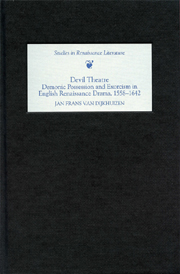CONCLUSION
Published online by Cambridge University Press: 12 September 2012
Summary
In the closing scene of The Devil Is an Ass (1616), Fitz-dottrell speaks the following lines:
Nay, then, 'tis time to leave off counterfeiting.
Sir, I am not bewitch'd, nor have a Divell:
No more then you.
(5.8.137–9)Fitz-dottrell's words are representative of one important strand within the staging of demonic possession and exorcism in English Renaissance plays. On the early modern English stage, possession is frequently represented as fraudulent, the belief in possession as misguided, and exorcism rituals as ineffective or as downright deceit. Yet the theatre also explored possession and exorcism as issues with a rich theological resonance and metaphoric potential. This dimension of the portrayal of possession and exorcism on the stage is exemplified by Quieto's words in the closing scene of The Phoenix (1603–1604), as he exorcises the demonically possessed lawyer Tangle:
The balsam of a temperate brain
I pour into this thirsty vein,
And with this blessed oil of quiet,
Which is so cheap, that few mean buy it,
Thy stormy temples I allay :
Thou shalt give up the devil, and pray
Forsake his works, they're foul and black.
Here, exorcism – with clearly Catholic overtones – is employed as a valid religious ritual, and as a convincing solution to the problems addressed in the play.
This ambivalent portrayal of possession and exorcism on the stage has been the subject of this study. I have investigated this ambivalence in relation to three issues : definitions of selfhood, the politics of religion, and the nature of theatre. Indeed, it has been one of the aims of this study to contribute to our understanding of early modern attitudes towards these matters. As I have tried to demonstrate, demonic possession in plays serves as an image of the kind of self from which male characters are trying to escape : overcome by desire ; unstable in its masculinity ; of a physical nature, and lacking, therefore, in inwardness. Yet, in spite of this emphasis on interiority, the stage also presented the body as a source of selfhood. Demonic possession was explored in the theatre as a pointer to this dimension of the self because it was depicted in contemporary prose texts as an intensely physical affliction.
- Type
- Chapter
- Information
- Devil TheatreDemonic Possession and Exorcism in English Renaissance Drama, 1558–1642, pp. 187 - 192Publisher: Boydell & BrewerPrint publication year: 2007



